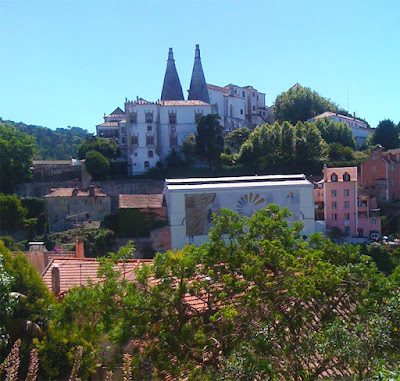Lisbon is sunny and fun. I got the good vibes from the first second I step my foot on the floor of the arrivals room at Aeroporto de Lisboa. I was happy with everything: the sunny whether, the ease I got out of the airport and found bus 44 to transfer me to the Comercio station, the way people responded to my english or the music that was selected for me by the shuffling mechanism of my mp3 player. The only thing I didn’t enjoy that much was the prices of the means of transport, but on the other hand the quality of the service is high enough to match the price.
In a previous post I have admitted that English is not my native language, but it is the one I use when I travel. That comes out instinctively and sometimes it is very useful. English is an international language and it is spoken in every airport and major train terminal. There are also some countries where most people can speak well enough. My home country is one of them. Italy and Portugal aren’t. But this is not a problem.
Trams (old and new) are part of the charm
Local people are not getting excited about the interiors of their old trams anymore
You see, Italians as well as Portuguese people will try hard to understand what you say, even if you speak a completely incomprehensive language, because they know how to read the language of the body, infer meaning from the context or use some common sense. techniques. For example, if they see a person alone in the middle of the desert saying “water, please, water”, they don’t need to speak English to understand that this person needs water. Or if they see a tourist with his giant baggage on his back asking “what is the bus line to Comercio station”, they don’t need to understand more than the key word “Comercio” to tell you to take a cab.

Yeah, I know, I shouldn’t have asked the taxi driver for bus information, but my point is I could communicate easily with that taxi driver, although he was speaking Portuguese and I was speaking English with awful accent. I also have to add that after a while I stop speaking English, and I start using my first language, which sounds Greek to most people, and it made no difference. You see, the taxi driver couldn't understand the words anyway. This didn't stop us from communicating. If it was an oral communication, it would go like this:
- Hi, I want to take the bus 44 to comercio. Where is the bus stop for that?
- You want to go to commercio? Why don't you take a taxi?
- A taxi? But I want the bus. How much will it cost me, anyway?
- Don't worry about the cost, my friend, the taxi is safe and convenient! In the bus you will have to be errect the whole time, and not in a good way, if you know what I mean. What's more, they are going to steal your money and rape your girlfriend.
- But I don't have a girlfriend.
- Of course you don't! Girls don't like people who take the bus in stead of a taxi. The taxi is nice, girls love it!
- So, you are not going to tell me then?
- I can tell you anything, just ask!
- OK, where is the stop for bus 44?
- Hey, weren't you listen to me all that time? What did I tell you? Do you want to get laid today? Take a taxi!
- Yeah, OK, thanks, I will ask at the tourist information desk over there.
All that without the words.
A beautiful silver tram. Most of them are yellow
The great Lisbon bridge connects the two bands of the Tago river. It is one of the longest in the world
To conclude, the communication method I present here is called “don’t be a snob”. If you really want to communicate, you don’t need to speak the same language as the other person. Move your hands, show things with your fingers, speak as clearly as possible, try to use words highly possible of being used in the other persons native language (e.g. taxi) What’s more, pay attention to what the other person is saying and doing, try to understand his or her position, don’t look for mistakes, look for meaning. This should be a lesson to all you English and French people out there, who are sometimes too scholastic about the correct use of your native language by foreigners.
Lisbon is a beautiful city and I can’t stress that enough. I fell in love with her from the first day. But for the moment, I will post a few photographs from the means of transport, so that I won’t have to do that again. An exception to this rule for the old trams that are still in use and are so nice when passing the dreamy shaped, tile-decorated, stone-made streets of downtown Lisbon.

Old tram with fish decoration. I don't know why
















